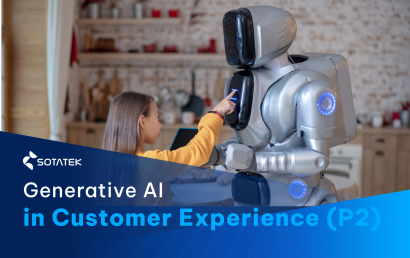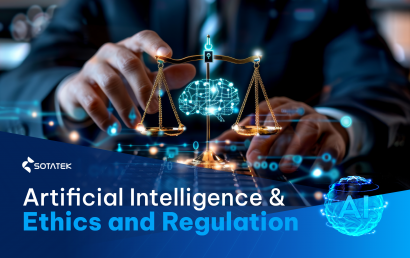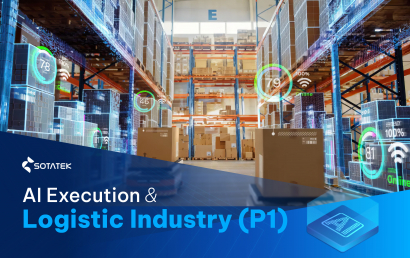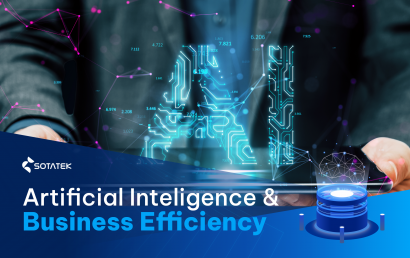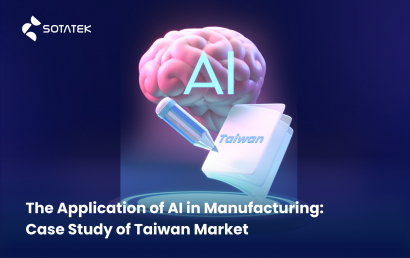Artificial Intelligence (AI) has been applied in customer service since the 2010s, but Generative AI (Gen AI) has taken its potential to a whole new level. Moving beyond fixed, scripted responses, Gen AI can generate personalized content and responses tailored to specific contexts when engaging with customers.
The global market for Gen AI in customer service is expected to grow from $308.4 million in 2022 to approximately $2,897.57 million by 2032, with a compound annual growth rate (CAGR) of 25.11%. This growth reflects the increasing demand for personalized customer service and 24/7 support capabilities.
Today, Gen AI is applied across the entire customer journey, from acquisition, engagement, development, and retention to brand advocacy. For instance, Gen AI can create diverse and personalized marketing content, helping companies like HubSpot increase email open rates by 20%. Additionally, it enables personalized shopping experiences, as seen with North Face, which achieved a 60% increase in customer interactions and a 50% boost in conversion rates. In terms of retention and brand advocacy, Gen AI can predict customer behavior and suggest retention strategies while automating content creation for social platforms, turning customers into loyal brand ambassadors.
The Shift in Generative AI Trends
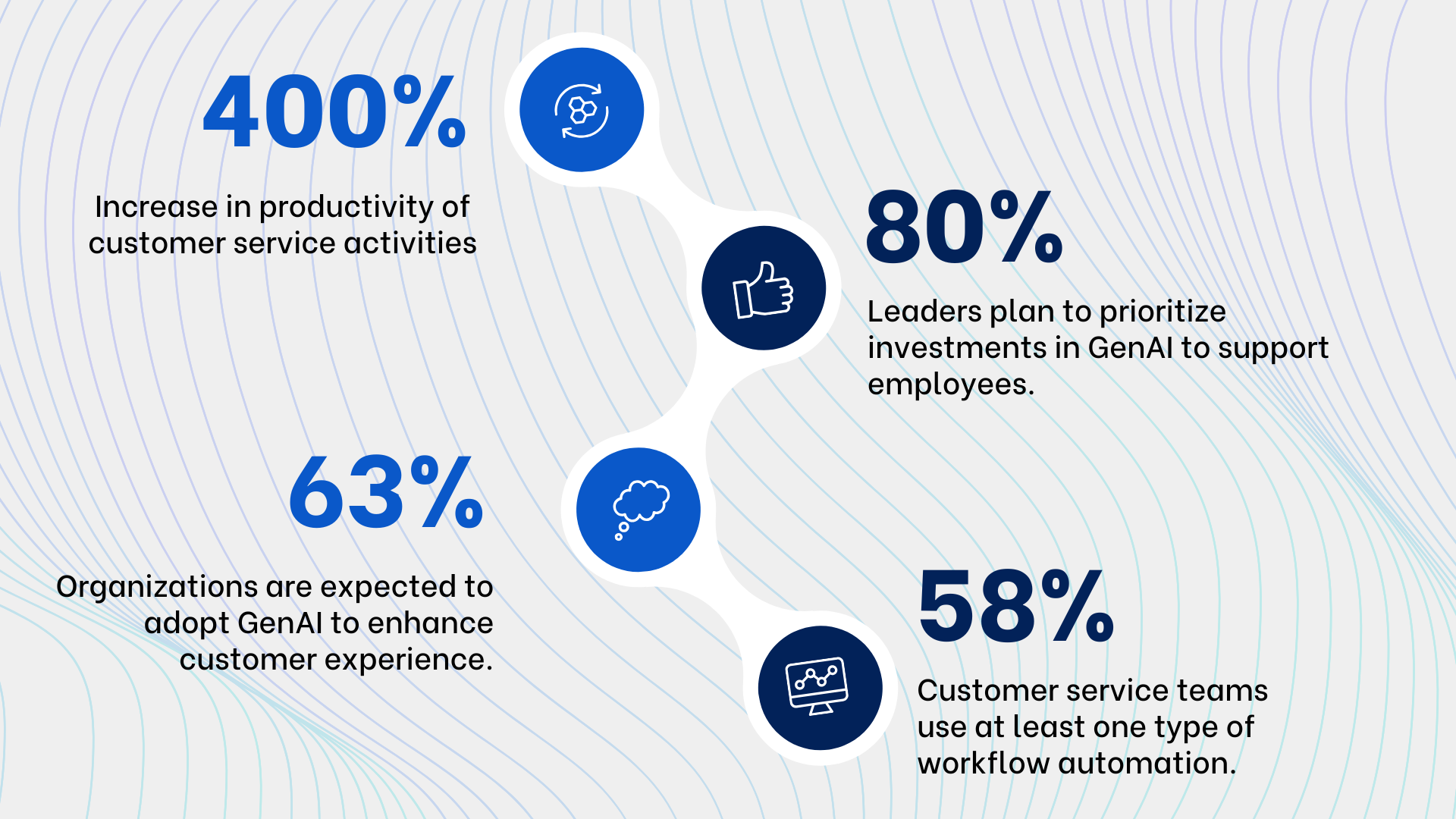
AI is not a new technology in customer service. Conversational AI-powered virtual assistants, capable of providing scripted responses, have been supporting customers since the 2010s. However, with the superior capabilities of Gen AI, this technology is experiencing explosive growth in customer service. It enables authentic, personalized 24/7 conversations with customers while unlocking opportunities to enhance customer experiences through advanced data search, analysis, and content creation.
The global market size of Generative AI in customer service was valued at $308.4 million in 2022 and is projected to surpass approximately $2,897.57 million by 2032, with a compound annual growth rate (CAGR) of 25.11% during the forecast period from 2023 to 2032 (Precedence Research, Bloomberg, IBM, Salesforce, Forbes)
Related: Generative AI in Product Design
Exploring the Evolution of AI-Powered Customer Support Solutions
Artificial Intelligence (AI) has significantly transformed customer service by offering innovative solutions tailored to diverse needs. These advancements have streamlined customer interactions and enhanced the overall service experience. AI-powered customer support can be classified into five distinct levels, each showcasing a progressive evolution in technology and capabilities.
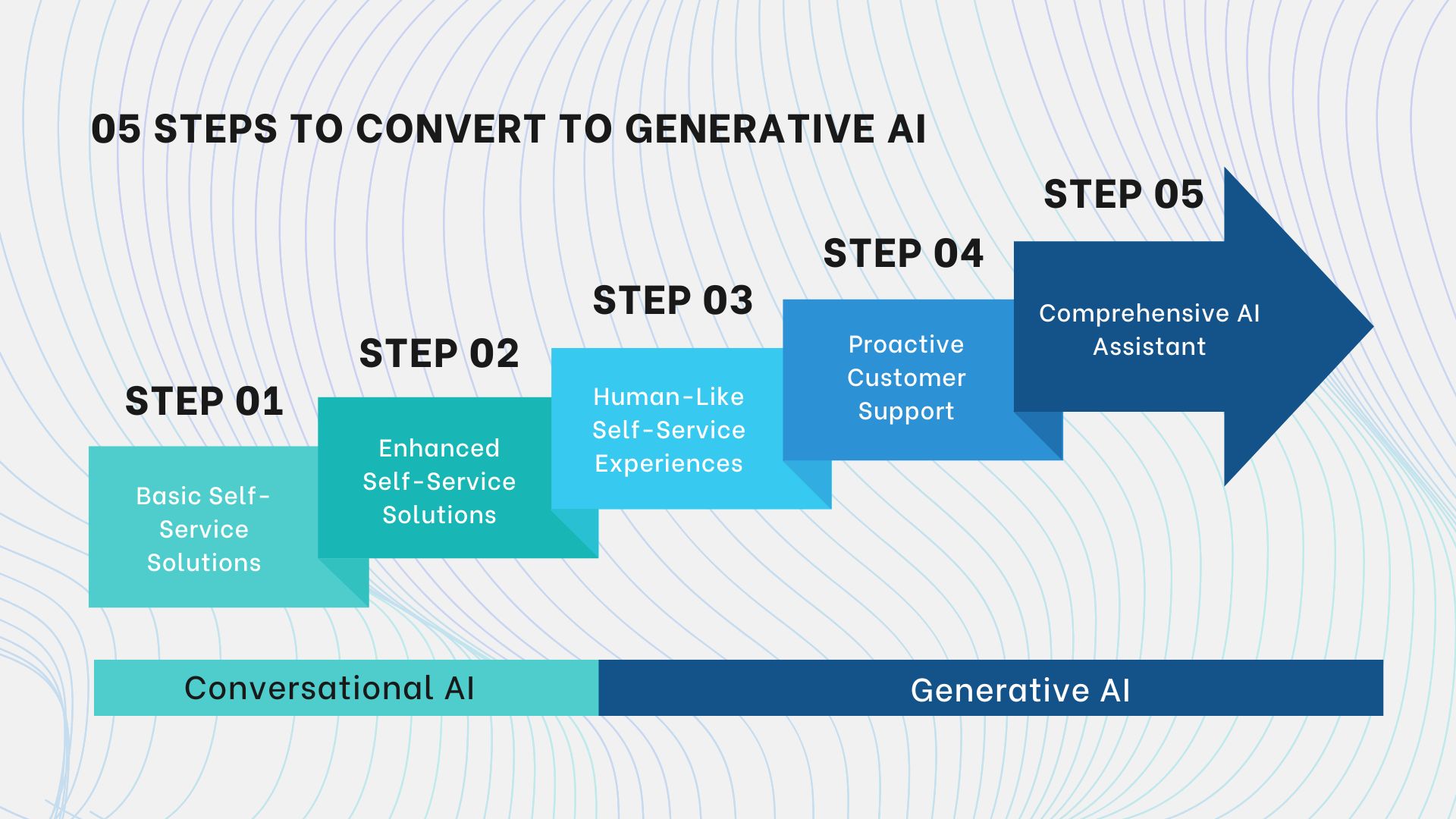
Conversational AI
At the most fundamental level, basic self-service solutions empower customers to find straightforward answers independently. These systems are particularly effective for handling Frequently Asked Questions (FAQs) and providing predefined documents that address common concerns. This approach is efficient for resolving simple inquiries, reducing wait times, and ensuring quick access to information.
The next stage introduces enhanced self-service solutions, where chatbots powered by advanced natural language processing (NLP) handle more complex and frequently asked questions. These systems often integrate with Robotic Process Automation (RPA) to minimize errors and optimize operational workflows. Additionally, they can seamlessly transfer unresolved issues to human agents, ensuring that no customer concern goes unanswered.
Response by Generative AI
The third level brings human-like self-service experiences. By combining voice bot technology with AI, this stage mimics the experience of interacting with a human agent. The system works collaboratively with live representatives to deliver precise, tailored solutions, creating a more personalized and satisfying customer journey.
Proactive customer support represents a significant leap forward in AI capabilities. At this stage, AI chatbots analyze customer behavior and context to predict potential issues and provide solutions before problems escalate. This proactive approach not only enhances customer satisfaction but also helps businesses prevent service interruptions by addressing issues at their root.
At the pinnacle of AI-driven customer support lies the comprehensive AI assistant. These assistants go beyond conventional problem-solving by acting as trusted partners throughout the entire customer journey. With context-aware capabilities and deeply personalized interactions, they cater to individual preferences and provide a seamless, engaging experience for users.
Together, these levels of AI-powered customer support illustrate the immense potential of technology to revolutionize how businesses interact with their customers. By adopting these solutions, organizations can achieve higher efficiency, deliver exceptional service, and foster stronger customer relationships.
| Criteria | Description |
| Principle of Operation | Generates automated responses and conversations similar to human interactions, helping customers feel more comfortable engaging. |
| Training Method | Uses large language models (LLMs) trained on vast amounts of data from customer service interactions, enabling flexible and creative responses. |
| Adaptability | Continuously learns and improves through each interaction, adjusting responses based on context and customer interaction history. |
| Response Quality | Delivers emotionally rich and natural responses, increasing customer satisfaction. |
| Learning Speed | Requires a longer initial training period but can continuously learn and adapt thereafter. |
| Scalability | May require more resources to scale when integrated into complex systems. |
| Cost Efficiency | High initial investment for implementation but cost-effective in the long run by automating processes and reducing labor costs. |
| Personalization | Delivers highly personalized customer service, tailored to each customer’s preferences and history. |
| Privacy | There may be privacy concerns due to the use of personal data in analysis and learning. |
Gen AI is applied throughout the entire customer experience journey
Generative AI (Gen AI) is revolutionizing industries, particularly healthcare, with its patient-centric approach and advanced capabilities. It seamlessly integrates into every stage of the customer experience journey, offering innovative solutions that enhance engagement, satisfaction, and loyalty.
In the Reach phase, Gen AI creates personalized and scalable content, enabling businesses to connect with customers more effectively. From crafting tailored messages to optimizing outreach campaigns, it ensures that initial interactions leave a lasting impression. Moving to Acquisition, Gen AI delivers highly customized shopping experiences. By analyzing individual preferences and usage patterns, it recommends products or services that align perfectly with customers’ unique needs, fostering trust and increasing conversion rates.
As relationships develop, the Nurture phase comes into play. Gen AI facilitates meaningful and engaging interactions with customers, ensuring their needs are met and loyalty is strengthened. It also proactively analyzes customer behavior, identifying opportunities to provide personalized recommendations and enhance satisfaction. In the critical Retention phase, Gen AI identifies customers at risk of leaving and implements targeted strategies to re-engage them, minimizing churn and sustaining long-term relationships.
Finally, in the Advocacy phase, Gen AI empowers businesses to turn satisfied customers into brand ambassadors. By generating shareable content like testimonials, reviews, and social media posts, it amplifies brand visibility and builds a community of loyal supporters. With its ability to adapt across every stage, Gen AI is becoming a vital tool for delivering exceptional customer experiences and driving business success.
Continue Reading: Generative AI: The Story of Elevating Customer Service Quality (Part 2)




